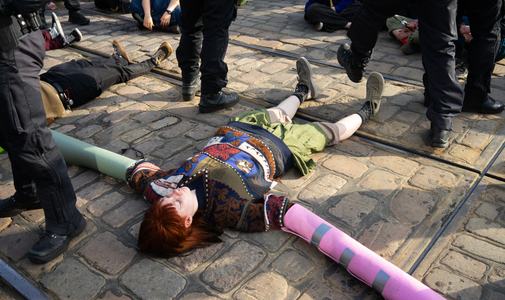The new Fidesz manifesto: the same, with us, next year
The government is following the "Putin model," says Fidesz, which claims in its new manifesto to want a "western-style" democracy. Fidesz officials are reluctant to believe their party is truly as popular as the opinion polls show. They think it is a trick, allowing their opponents to laugh as their support levels dwindle from the beginning of next year.
Tibor Navracsics was behind the decision to launch the manifesto at yesterday's conference at the Golyavar in Budapest. It was he who created a coherent document out of a series of seminar debates. This explains why the 100-page document has little of the rabble-rousing enthusiasm of its predecessor. The electoral manifesto created by Viktor Orban out of the 2006 'National Consultation' offered something concrete to almost every social group. The new manifesto, A Strong Hungary, only promises the hope of a better future. But, if one is to believe party sources, the party chairman's voice will be heard. Orban recently retreated to his house in Felcsut to create a more populist version of this dry manifesto. This is to be a continuation of his recent book "There is one country."
The party was not unanimous on the need for a manifesto in the middle of the parliamentary term. Even if the prime minister were to change, as in 2004, there would be little chance of a shift in the parliamentary balance of power. Calling the referendums (on GP consultation fees, tuition fees and hospital fees) early elections is just a poetic metaphor, just as it was when Viktor Orban called the 2006 local elections "the third round of the parliamentary elections."
Fidesz's new manifesto sets out some general principles. It sketches out the world view that should underpin a later electoral or governmental manifesto, according to Navracsics. That the party has failed to come up with any details is explained away by saying that they have learned from Angela Merkel's mistake. By outlining concrete proposals, they say, she gave the Social Democrats the chance to highlight their weaknesses, allowing them to chip away at her substantial lead. In the past, Fidesz has said the government would steal any good ideas they unveiled at this point. Things have changed to the extent that Fidesz now says it does not mind if the government does what Fidesz wants, but that they do mind if this is done by plagiarising and distorting their ideas. This happened with the budgetary supervision authority idea, they say: Fidesz wanted a small oversight board. This became a much larger oversight authority.
The manifesto is designed to show that the party is read for government. Fidesz has been trapped on a single course since unveiling its referendum proposals last autumn, becoming the prisoner of a permanent referendum campaign. They are obliged to discuss consultation, tuition and hospital fees even when much larger issues - like health insurance - are at stake.
While the manifesto was being drawn up, it looked like Fidesz was trying to get away from its conservative periphery of conspiracy theories asserting that the governing coalition's only aim was to ruin the country, selling it off to foreign interest groups. But Orban's speech at the weekend suggests that the old conspiracy theory has just been exchanged for a new one. Fidesz had "recognised" the government's goals - until now they had failed to understand because they believed the government shared the same vision of society. But Orban now says the government wants to creat an eastern-, or Russian-style society; "not as brutal," of course, "but a central and east european, operetta-style, Viennese version of it." The government's aim, Orban claims, is to force ever more people into need, people who depend on hand-outs or transfers from central government.
This is strange coming from Fidesz, which has until now criticised the government for cutting down the state, for leaving citizens to fend for themselves. The opposition party was criticised for advocating the "Biedermeier socialism" of the late Kadar era, impeding capitalism in exchange for moderate authoritarianism. Orban has tried to put a stop to these criticisms by saying that secure property and a regular income are what citizens need if they are to take care of themselves. But since Hungarians do not enjoy these rights, Fidesz's manifesto is needed to implement them. By contrast, he says, the government wants most of society to depend on a small elite.
"Freedom always came from the West," the manifesto repeats. Yet neither Merkel nor Nicolas Sarkozy are building up state welfare programmes at the moment. And how is this all to be paid for? From bumper surpluses resulting from future economic growth.
JÁNOS DOBSZAY
© Fazekas István |
Fidesz's new manifesto sets out some general principles. It sketches out the world view that should underpin a later electoral or governmental manifesto, according to Navracsics. That the party has failed to come up with any details is explained away by saying that they have learned from Angela Merkel's mistake. By outlining concrete proposals, they say, she gave the Social Democrats the chance to highlight their weaknesses, allowing them to chip away at her substantial lead. In the past, Fidesz has said the government would steal any good ideas they unveiled at this point. Things have changed to the extent that Fidesz now says it does not mind if the government does what Fidesz wants, but that they do mind if this is done by plagiarising and distorting their ideas. This happened with the budgetary supervision authority idea, they say: Fidesz wanted a small oversight board. This became a much larger oversight authority.
The manifesto is designed to show that the party is read for government. Fidesz has been trapped on a single course since unveiling its referendum proposals last autumn, becoming the prisoner of a permanent referendum campaign. They are obliged to discuss consultation, tuition and hospital fees even when much larger issues - like health insurance - are at stake.
Second page of December Theses (Oldaltörés)
While the manifesto was being drawn up, it looked like Fidesz was trying to get away from its conservative periphery of conspiracy theories asserting that the governing coalition's only aim was to ruin the country, selling it off to foreign interest groups. But Orban's speech at the weekend suggests that the old conspiracy theory has just been exchanged for a new one. Fidesz had "recognised" the government's goals - until now they had failed to understand because they believed the government shared the same vision of society. But Orban now says the government wants to creat an eastern-, or Russian-style society; "not as brutal," of course, "but a central and east european, operetta-style, Viennese version of it." The government's aim, Orban claims, is to force ever more people into need, people who depend on hand-outs or transfers from central government.
This is strange coming from Fidesz, which has until now criticised the government for cutting down the state, for leaving citizens to fend for themselves. The opposition party was criticised for advocating the "Biedermeier socialism" of the late Kadar era, impeding capitalism in exchange for moderate authoritarianism. Orban has tried to put a stop to these criticisms by saying that secure property and a regular income are what citizens need if they are to take care of themselves. But since Hungarians do not enjoy these rights, Fidesz's manifesto is needed to implement them. By contrast, he says, the government wants most of society to depend on a small elite.
"Freedom always came from the West," the manifesto repeats. Yet neither Merkel nor Nicolas Sarkozy are building up state welfare programmes at the moment. And how is this all to be paid for? From bumper surpluses resulting from future economic growth.
JÁNOS DOBSZAY



















